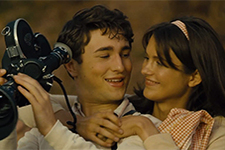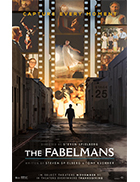The Fabelmans
|  To some degree or other, the majority of the films Steven Spielberg has made over the past half-century have been autobiographical. He has drawn heavily on his own childhood in films as diverse as E.T. The Extra-Terrestrial (1982) and Catch Me If You Can (2002), and his complex relationship with his father has informed a long litany of absent, problematic, and redeemed father figures in films like Close Encounters of the Third Kind (1977), Indiana Jones and the Last Crusade (1989), Hook (1991), and War of the Worlds (2005). His evolving Jewish identity, his personal fears and phobias, and his fascination with history have all driven his directorial choices over the years, so it is only appropriate that, so late in such a long, distinguished career, he has decided to make a film as fully autobiographical as The Fabelmans. Granted, all the names have been changed, events have been condensed or elided, and it is given a happier ending than Spielberg’s actual life had at that moment, but as a whole The Fabelmans is a close match to Spielberg’s childhood, adolescence, and emergence into young adulthood. Of course, all of that would just be academic backstory if Spielberg hadn’t made such a genuine, engaging, warm and funny drama. The Fabelmans is one of his best films in years, as it draws on so many of his unique strengths as a filmmaker and storyteller, melding together his own memories with a broader canvas of an evolving America in the second half of the 20th century, in the process deftly navigating familial turmoil, ethnic identity, technological evolution, upward mobility, and, to put it bluntly, the primal power of movies. It is no surprise that Spielberg and his co-screenwriter Tony Kushner (with whom he previously worked on Munich [2005], Lincoln [2012], and West Side Story [2021]) begins the film with the image of his cinematic alter ego, Sammy Fabelman, standing outside a movie theater in 1952, a 10-year-old child flanked on one side by his mother, Mitzi (Michelle Williams), and his father, Burt (Paul Dano), both explaining to him why he shouldn’t be scared to see his first movie (Cecil B. DeMille’s The Greatest Show on Earth). The manner in which they talk to him encapsulates their fundamental differences and why they will each be so instrumental in shaping Sammy as a budding filmmaker: Mitzi, a free spirit and talented pianist who gave up performing to be a housewife, encourages him to think of the movie like a dream, while Burt, the practical and logic-minded computer scientist, explains the technical aspects of the motion picture apparatus. Spielberg captures the scene in a single, long take, and it is a beautiful opening and a compelling distillation of the ethereal art and grounded science of movies–the intertwined magic that will eventually consume him. That young Sammy (Mateo Zoryon) is transfixed by the climactic (and traumatic) train crash in the film, and he becomes obsessed with recreating it with a train set he gets for Hanukkah. Repeatedly staging the crash and filming it with his father’s new 8mm home movie camera, Sammy steps into the world of filmmaking as personal catharsis, a thread that will drive his work. Sammy exists in the middle of a big, messy, complicated family. In addition to his father and mother, whose relationship is complex and ever-changing, he has three younger sisters, a testy grandmother (Jeannie Berlin), and his father’s best friend, Bennie (Seth Rogen), who is like an uncle. One of the constant themes of Sammy’s family life is change, as his father’s gradual ascent up the professional ladder of the then-new world of computer science takes them from New Jersey, to Arizona, and finally to central California, where, as a teenager (now played by Gabriel LaBelle), Sammy encounters the traumas of a pained adolescence marked by familial breakdown, bullying at school, and the stumbles and bumbles of first love. Spielberg captures these highs and lows with both dramatic insight and a peristent sense of humor. His willingness to look the ugliness of anti-Semitism so directly makes for some genuinely raw moments, as the increasingly WASP-ish worlds Sammy must navigate becomes mine fields of prejudice and cruelty. One of the film’s most powerful sequences finds Sammy confronting his nemesis, a blonde jock named Logan (Sam Rechner), after depicting him in a school movie as one Leni Riefenstahl’s Olympic Aryan gods, but in a way that could be either straight or parodic. The presence of the camera comes to define Sammy’s existence, and he uses it as escape, as therapy, and as revelation. A key moment comes when his camera inadvertently captures a difficult truth about his mother’s relationship with Bennie, while at another time it is used against his will to portray her in all her artistic glory, unmoored from pretension and expectation as she dances backlit by car headlights while on a family camping trip. At other times, the camera becomes a tool of escapism, and some of the film’s greatest delights are the depiction of the teenage Sammy’s clever cinematic tricks that allow him to create epic films with modest resources. The Fabelmans is a probing family drama, but it is also suffused with a genuine love of the art of cinema and all its potentials, which is why the film concludes with the college-age Sammy in the office of the irascible Hollywood director John Ford, who in the late 1960s was near the very end of his storied Hollywood career. Played in an expectedly powerful and amusing turn by director David Lynch, Ford has but a few words of advice for the burgeoning filmmaker, but their essence provides Spielberg the delightful coda he needs for the final shot of what could be—but let us hope is not—his last film. Copyright © 2022 James Kendrick Thoughts? E-mail James Kendrick All images copyright © Universal Pictures |
Overall Rating: 


 (3.5)
(3.5)


